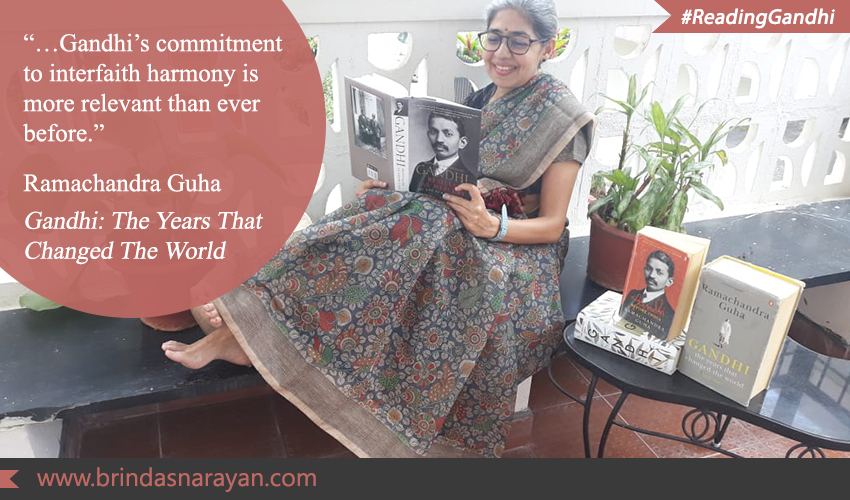
Reading Gandhi: Understanding The Nation’s Founder
A recent article in The Hindu featured three artists who have painted murals at Indiranagar in Bangalore. Figures depicted on their colorful wallscapes include the mathematical genius Srinivasa Ramanujan, the religious teacher and educational philosopher J. Krishnamurti and the scientist J.C. Bose. Other national icons who find a space on the wall are the constitution maker and social reformer B.R. Ambedkar and freedom fighter Chandrasekhar Azad. One artist commented that the reason Gandhi did not make it to their list was that the leader is already well known. As a reader and writer, that got me thinking: what does it mean to know Gandhi? As an Indian citizen who will soon be turning 55, I can personally claim this for myself: I know very little about Gandhi.
Choosing To Read Gandhi
So the impulse propelling this series is, very honestly, a selfish one. I want to imbue myself with a purpose to “read” Gandhi – as in literally plow through dense tomes written about the leader (and by him) – but also to read him as a writer. Which would include plumbing his psychological make-up, understanding his social context and getting to know the man as one would with a fascinating new friend.
To those of you who might have accidentally or politely subscribed to this, I must add a few caveats: I’m not a historian or a Gandhi scholar. At this point, I would best describe myself as a dilettante, a reader and writer who can flit quite easily from this topic to that, because honestly, is anything more interesting than the world? Even if parts of that world lie inscribed in books, or in remembered vignettes or in the thoughts that flickered across the spectacled face chuckling on our currency notes.
That’s one reason. There’s another. I recently read that the historian Ramachandra Guha’s books on Gandhi are going to be turned into a web series. Linking this to a column recently penned by Manu Joseph in The Livemint, wherein he suggested that most readers, when confronted by a web series or film version of a favorite book, would aver that the book was better. Primarily, Joseph observes, this is to impress others that one has read the book. As a member of that pretentious tribe, I can definitely relate to the sentiment. So I’m also starting this blog series in order to be able to say, whenever the web version does explode onto our screens, that the books were better. Or even to claim, despite my own limited knowledge of the subject, that they got this wrong and that right.
Why Gandhi Stays Fascinating
But why Gandhi? Because, given the smatterings I’ve read about him so far, he’s filled with alluring contradictions. He’s the kind of character that we writers would have loved to dream up. He could be infuriating no doubt, and often disconcerting to people around him. He was finicky about his own personal discipline but strangely indifferent to “rules” devised by others. Someone whose soft outer demeanor masked a steely internal resolve. In an era where “sharing” was hardly the norm, Gandhi was exhaustively transparent, revealing awkward thoughts and personal fumbles, in Harijan articles or personal diaries. And, in the process, confounding both himself and others with perplexing next steps.
Moreover, as the ever-incisive Guha puts it in his Epilogue of Gandhi: The Years That Changed the World: “Gandhi rejected both the atheism of the intellectuals as well as the arrogance of the missionaries. He did not think science had all the answers to the mysteries of the universe. Faith answered to a deep human need. Yet Gandhi did not think there was one privileged path to God either. He encouraged inter-religious dialogue so that individuals could see their faith in the critical reflections of another.” More touchingly, at one of the memorial services held in the recently assassinated leader’s honor, the Secretary of a local Muslim league said: “Mahatma Gandhi was the twentieth century Christ, and he died for us Muslims.” This speech was reported by the founder of a Christian ashram.
Reading As a Form of Non-Doing
On 6th April 1930, Gandhi picked up lumps of salt from the sea. A simple act, that changed the course of history. It doesn’t escape me that today is August 15th 2022, exactly 75 years after our nation wrested its freedom from the British. One wonders what simple action one could take, in contemporary times, to make a statement that the founder would approve of. In How to Do Nothing Jenny Odell makes a compelling case for doing nothing as a powerful indictment against the hyper-consumerist/hyper-productivist worlds we inhabit. The closest that one could get to “doing nothing” would be to just read Gandhi. I’m not sure if any others will agree about framing such an action in this way. “Reading Gandhi” is my way of being the change one wants to see in the world.
References
Ramachandra Guha, Gandhi: The Years That Changed The World 1914-1948, Allen Lane, Penguin Random House, 2018
Jenny Odell, How To Do Nothing: Resisting the Attention Economy, Melville House (Penguin Random House), 2020





Thanks on your marvelous posting! I genuinely enjoyed reading it,
you might be a great author.I will ensure that I bookmark your blog
and will come back later on. I want to encourage you to continue your great
writing, have a nice afternoon!